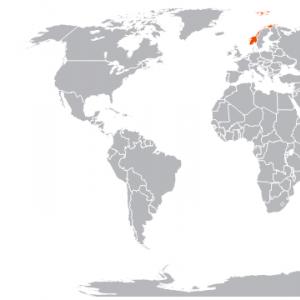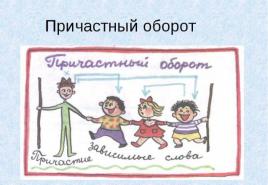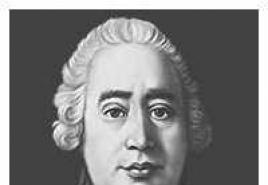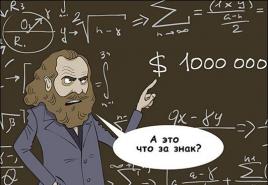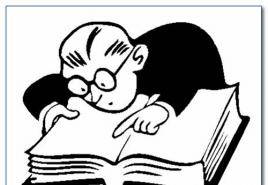What is the difference between a term and a concept. Difference between lexical meaning and concept
Terms concept and definition belong to dialectical philosophy. It is known that there is a fundamental difference between them. How do these important scientific categories differ from each other? Let's try to figure it out.
Definition
Concept- generalization of objects or phenomena according to any characteristic signs for them, reflected in thinking.
Definition - the process of fixing a specific meaning for linguistic terms using logic.
Comparison
A concept is a form of thinking that is capable of embracing many things that we perceive at the level of feelings, and, highlighting their general and private properties, classify them. The concept is essentially infinite, it is developed by the universal Reason.
Definition (sometimes it is called a definition) is inherently of course, it is the result of intellectual activity. The definition assigns an object to one of the categories, describing its main distinguishing features. Definition, according to Hegel, correlates with immediate representation, it does not correspond to the Absolute. The task of philosophy is to translate every idea into a concept, thus getting rid of finite definitions and turning to infinite concepts.
The concept is infinite, because it represents knowledge, not limited by any external conventions in relation to Reason. The concept contains meaning, and the definition is an action aimed at identifying this meaning. A concept is a word that has been defined. And each of the concepts needs to be defined. Without a definition, a word (even the most widespread one) is not a concept. To give a definition to a concept means to explain its meaning with all possible clarifications. Moreover, it is important to do this within the framework of this philosophical system. Each philosopher has his own definition of a concept, his own understanding of a specific word. Therefore, in a philosophical conversation, even reproducing someone else's concept, it is imperative to define it, since everyone understands differently.
Conclusions site
- A concept does not exist without a definition.
- The concept is endless, the definition is the final definition.
- The concept is developed by the Reason, the definition - by the reason.
- The concept is closer to the Absolute, it is not limited by any external conditions.
- A concept contains meaning, and a definition is an action aimed at identifying that meaning.
Lexical meaningbeing linguistic category, captures the everyday display of reality in the mind of a person. Concept – logical category, including the most general, essential features of objects, their distinctive properties.
-
Terms and concepts of linguistics: Vocabulary. Lexicology. Phraseology. Lexicography
- - A type that takes into account the primacy of the meaning of a word or motivation by any meaning of the same word. Highlighted: 1) unmotivated and motivated meaning of the word ...
Terms and concepts of linguistics: Vocabulary. Lexicology. Phraseology. Lexicography
- - The type, which is based on the method of nomination, the way in which the phenomenon of reality is called: directly or indirectly. Highlighted: 1) direct 2) figurative values \u200b\u200b...
Terms and concepts of linguistics: Vocabulary. Lexicology. Phraseology. Lexicography
- - Connotations ...
Terms and concepts of linguistics: Vocabulary. Lexicology. Phraseology. Lexicography
- - 1) G.Z. is an intralingual meaning, since contains information about relationships, connections between linguistic units, regardless of the presence of these relationships in extra-linguistic reality ...
- - Potential and probabilistic values \u200b\u200b...
Dictionary of linguistic terms T.V. Foal
- - The word has form and meaning ...
Dictionary of linguistic terms T.V. Foal
- - A class of meanings, determined by which aspect is the basis for the classification of the semantics of a word ...
Dictionary of linguistic terms T.V. Foal
- - A type that takes into account the primacy of the meaning of a word or motivation by any meaning of the same word Highlighted: unmotivated and motivated meaning of the word ...
Dictionary of linguistic terms T.V. Foal
- - Connotations ...
Dictionary of linguistic terms T.V. Foal
- - Lexical meaning, being a linguistic category, fixes the everyday display of reality in the mind of a person ...
Dictionary of linguistic terms T.V. Foal
- - The lexical meaning of the word and the concept have the following common features: 1) both are ideal, stored in the mind of a person; 2) both represent a set of certain features of the designated phenomenon ...
Dictionary of linguistic terms T.V. Foal
- - The type, which is based on the method of nomination, the way in which the phenomenon of reality is called: directly or indirectly. Highlighted: 1) direct and 2) figurative values \u200b\u200b...
Dictionary of linguistic terms T.V. Foal
- - One of the components of a dictionary entry, which is central and sets the number of meanings of a word and the definition of each meaning separately ...
Dictionary of linguistic terms T.V. Foal
- - Common and / or scientific concept ...
Dictionary of linguistic terms T.V. Foal
"difference of lexical meaning from concept" in books
1 BASIC VALUES OF THE CONCEPT OF "CULTURE"
From the book Culturology. Crib author Barysheva Anna Dmitrievna1 BASIC MEANINGS OF THE CONCEPT OF "CULTURE" The original Latin use of the word "culture" comes from the words colo, colere - "cultivate, cultivate the land, engage in farming." But already Cicero began to find a wider use of this term -
1. The concepts of "culture", "civilization" and concepts directly related to them
From the book Theory of Culture author author unknown1. The concepts of "culture", "civilization" and concepts directly related to them Culture (from Lat. Cultura - processing, cultivation, ennobling and cultus - worship) and civilization (from Lat. Civis - citizen). There are many definitions of culture and different interpretations
QUESTION 1: In talking about whether famine was a manifestation of genocide, we need to discuss three points: historical methodology, the definition of hunger and the definition of genocide
From the book by Mark Tauger on hunger, genocide and freedom of thought in Ukraine author Todger Mark BQUESTION 1: In discussing whether famine was a manifestation of genocide, we need to discuss three points: historical methodology, definition of hunger, and definition of genocide A. Methodology. Based on the results of many years of work, historians have developed certain
3.2.3.2. Analysis of the lexical composition of the text
From the book Applied Software: Automatic Word Processing Systems author Malkovsky Mikhail Georgievich3.2.3.2. Analysis of the lexical composition of the text Program LEX1 The program calculates how many times a word is used in the text (area). The program generates a complete list of all the different words in the text, indicating the frequencies of their occurrence. You can set the frequency range
Revision of lexical analysis
From the book Let's Build a Compiler! author Crenshaw JackRedefining Lexical Analysis Introduction I have good news and bad news. The bad news is that this chapter is not the one I promised you last time. Moreover, the next chapter is also. Good news for the reason this chapter appeared: I found a way to simplify and
Tip 6: Beware of C ++ Parsing Weirdness
From the book Using the STL Effectively by Meyers ScottTip 6: Beware of the Weirdness of C ++ Parsing Suppose you have a file containing int numbers and you want to copy those numbers into the list container. At first glance, the following solution looks quite reasonable: ifstream dataFile ("ints.dat"); list
1. Empty values \u200b\u200b(Empty-values)
author author unknown1. Empty values \u200b\u200bAn empty value is simply one of the many possible values \u200b\u200bof some well-defined data type. Let's list the most "natural", immediate empty values \u200b\u200b(that is, empty values \u200b\u200bthat we could distinguish
2. Undefined values \u200b\u200b(Null values)
From the book Databases: lecture notes author author unknown2. Undefined values \u200b\u200b(Null values) The word Null is used to denote null values \u200b\u200bin databases. To better understand what values \u200b\u200bare understood as null values, consider a table that is a fragment of a database: So, undefined
Question 12. The concepts of "lawyer" and "advocacy". Types of legal assistance provided by lawyers. Guarantees for the independence of a lawyer. The concepts of "lawyer" and "advocacy"
From the author's Bar ExamQuestion 12. The concepts of "lawyer" and "advocacy". Types of legal assistance provided by lawyers. Guarantees for the independence of a lawyer. The concepts of "advocate" and "advocacy" An advocate is a person who has received, in accordance with the Law on the Bar
QUESTION: What are the similarities and what is the difference between the concept of "fasting" in the traditional, broad meaning of this word from the concept of "unloading diet therapy"?
From the book Heal Yourself. On fasting therapy in questions and answers (2nd edition) author Voitovich Georgy AlexandrovichQUESTION: What are the similarities and what is the difference between the concept of "fasting" in the traditional, broad meaning of this word from the concept of "unloading diet therapy"? ANSWER: Complete abstinence from food when consuming water and in motor mode is used by a person with
Impaired understanding of the phonemic and lexical structure of speech
From the book Language and Consciousness author Luria Alexander RomanovichImpaired understanding of the phonemic and lexical structure of speech.Decoding of the perceived speech message (oral or written) begins with the stage of decoding the perceived system of sounds using a certain phonemic structure of the language, in which
DIFFERENCE
From the book Against the women! author Khmelevskaya JohnDIFFERENCE is the word. But more on that later. Females had to spend a lot of effort to get through. The man plowed his own, it seems he plowed well, you can now relax, figuratively speaking, drink a beer, but then what? Take a bite! Run up! Some kind of gangrene plowed
c) Their difference (6: 52-59)
From the book of the Gospel of John author Milne Brucec) Their difference (6: 52-59) Here Jesus points out the difference between those who truly believe. He speaks in clear language. To believe is to eat the flesh of Christ Himself and drink His blood. It is quite clear that He means His crucifixion on the cross. We must remember that He is proclaimed
Two meanings of the concept of religion
From the book History of World Religions author Gorelov Anatoly AlekseevichTwo meanings of the concept of religion The word "religion" comes from the Latin religio - piety, shrine, connection. All these meanings are included in the concept of religion. Some objects are defined in religion as sacred, believers feel a connection with them and revere them. "Religion is the one
Semantic components of lexical meaning
From the book Without distorting the Word of God ... author Beekman JohnThe word "concept" and the word "definition" are two terms that we often come across in our daily life. We constantly operate with them in colloquial speech, often without thinking about what they really mean.
Modern individuals, in their overwhelming majority, use linguistic categories at the level of intuition, and almost never try to thoroughly grasp the meaning of this or that meaning. Everything seems to be clear. But meanwhile, without these two words (or rather, without these two basic mechanisms of thinking, which are hidden behind them), our brain could never make a correct picture of the world around us. The properties of objects and phenomena would not be known to us, and linguistic communication would be many times difficult, because in many cases we simply could not understand each other. So, dear readers, let's finally consider ...
What is the concept
Concept is one of the terms used by dialectical philosophy... This word has a great variety of definitions. Many famous philosophers have given their own personal interpretation of this category. Among them were Hegel, Lenin, Berkov, Azarenko and many others. Lenin, for example, called the concept the highest product of the activity of the human brain, which, in turn, is the highest manifestation of living matter. To be more understandable to the reader, we give the shortest definition of the term "concept", which in the most concise form explains its essence.
The concept is one of the main forms of human thinking, which reflects in general terms the essence of the phenomena and objects of the real world around us, highlighting both general and specific signs among them, and consolidating the experience gained in definitions (definitions).

What is the definition
What, then, is “definition”? This is another philosophical term that is characteristic of both dialectical philosophy and logic, in which it has another name - definition.
Definition (definition) is precise interpretation of a concept, which carries a clear, fixed meaning.

Simple examples to help you better understand the meaning and meaning of these two terms
So, we figured out that a concept is the general signs of an object or phenomenon (or a group of objects or phenomena), information about which our brain received through the senses. In fact, such information that has undergone primary processing is an abstraction, which reflects only the general features of objects. Thus, the words and phrases that we use in everyday speech are nothing more than a form through which we can express our concepts.
Every concept must have a definition... Otherwise, it risks getting the label “indefinite” and replenishing the vast vocabulary of “empty” aphorisms of demagoguery. It is thanks to the definitions (definitions) that we know the exact meaning of this or that word combination.
It is thanks to definitions that we can use synonyms. It is thanks to definitions that we are able to distinguish homonyms in our speech. Indeed, many words of our language, with the same spelling and pronunciation, have diametrically opposite meanings (homonyms). And vice versa - many of the components of our speech have different spelling and pronunciation, but mean the same thing (synonyms). If there were no definitions, then humanity would cease to understand each other. It is thanks to definitions that we have a detailed concept of any action and process taking place in the reality around us.
To better understand the knowledge gained, let's look at simple examples of concepts and definitions that will help us better understand the difference between these terms.
Example one
The word "scythe" has several meanings. This is a sea bank, and a woman's hairstyle, and an agricultural tool. In this case, "scythe" is an undefined concept. But if we say - a fair-haired braid, then this will already be a definite concept. If we say - the fair-haired braid of Margarita Popova, then this will already be a definition. That is, the speech here will not be about some kind of abstraction, but about a certain object, the description and properties of which are well known to us (or we can recognize them).
Example two
As a second example, which will help us distinguish concept from definition, the word “ element". At the moment, it is also an undefined concept for us. We do not know exactly what this object is. It can be a battery in the control panel, one of the parts of a metal structure, or a social stratum of society. Our brain needs more information. Upon receipt, it turns out that it is a chemical element. Now an indefinite concept turns into a definite one. On closer examination, it turns out that it is plutonium. From this moment on, a certain concept becomes a definition (definition). That is, abstraction turns into a concrete object with precise, fixed properties.
The difference between a concept and a definition
In order to better navigate this issue, we give a short list of the main differences between the category "concept" and the category "definition".
- Concept - represents endless mental abstraction, where an indefinite number of objects or phenomena can be entered. Definition - is a fixed description of any one specific object or phenomenon. abstract thinking categorygenerated by reason. Definition - a method of rationalistic knowledge, generated by reason.
- The concept is not constrained in cognition by any conventions or mental boundaries, beyond which one cannot go. Therefore, unlike the definition, it is much closer to the main root cause (the Absolute).
- The concept already contains the truth, while definition is a process aimed at revealing this truth.
We hope that the article you just read has helped you better understand what a "concept" is and understand what a "definition" is. In conclusion, I would like to wish you good luck in the further development of complex philosophical terms, which, in fact, turn out to be not so difficult. The main thing is to show a little perseverance and curiosity in mastering a specific issue. Good luck to you.
The word "term" (terminus) is Latin and once had the meaning of "limit, border". A term is a word or phrase that serves to unambiguously and accurately designate (name) a special, scientific concept in a certain system of special concepts (in science, technology, production). Like any common word, the term has content, or meaning (semantics, from the Greek semantikos - denoting), and a form, or sound complex (pronunciation, spelling). In contrast to non-terms, that is, from all the rest of the common noun vocabulary, which denotes everyday, everyday, so to speak "naive" concepts, terms denote special, scientific concepts. \\
What is a concept in general as a category of logic? The Philosophical Encyclopedic Dictionary defines the concept as follows: "Thought reflecting in a generalized form objects and phenomena of reality and connections between them by fixing general and specific features, which are the properties of objects and phenomena and the relationship between them." The concept has content and scope. The content of a concept is a combination of the attributes of an object reflected in it. The scope of a concept is a set (class) of objects, each of which has attributes that make up the content of the concept.
In contrast to ordinary, everyday concepts, a special, scientific concept is always a fact of a scientific concept, the result of theoretical generalization. The term, being a sign of a scientific concept, plays the role of an intellectual tool. With its help, scientific theories, concepts, provisions, principles, laws are formulated. The term is often a messenger of a new scientific discovery, a phenomenon. Therefore, unlike non-terms, the meaning of a term is disclosed in a definition, a definition that is necessarily attributed to a term. A definition is a formulation in a concise form of the essence of the terminated, i.e., designated by the term, concept: only the basic content of the concept is indicated. For example: "ontogenesis (Greek on, ontos being, being + genesis generation, development) is a set of successive morphological, physiological and biochemical transformations of an organism from its inception to the end of life"; "Aerophiles (Greek aёr air + philos loving) are microorganisms that receive energy only from the oxidation of oxygen in the environment."
As you can see, the definition does not just clarify the meaning of the term, it sets this meaning. The requirement to define what a particular term means is tantamount to the requirement to give a definition of a scientific concept.
In encyclopedias, special explanatory dictionaries, textbooks, the concept (term) introduced for the first time is revealed in definitions. Knowledge of the definitions of those concepts (terms) that are included in the curriculum for the disciplines is a mandatory requirement for the student.
It goes without saying that the conceptual content of terms can be fully and strictly scientifically disclosed only when studying special disciplines at the relevant departments. When teaching the Latin language and the basics of medical terminology in the first year, such a task is not and cannot be set.


